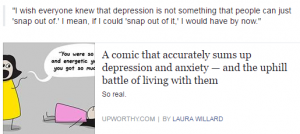I’ve been seeing a number of ads and promotions for Bell Let’s Talk Day (happening tomorrow on January 25) these last couple weeks. It’s not my first time coming across this initiative, but I was surprised to find out the movement began in 2010, when the topic of mental health–at least to me–seemed far less publicly discussed. One of the goals of this initiative is, of course, to get people talking about mental health, thus promoting awareness, reducing stigma, and improving understanding of mental health challenges many of us face. All very great things!
So I started to wonder whether “talking” about issues such as depression and anxiety is sometimes difficult not merely because we don’t want to share our struggles and our experiences– but because we don’t know how to talk about it. Explaining the experience, describing the struggle, attaching words to the feelings we barely understand ourselves can sometimes be the hardest part. That’s when I came across this lovely little comic. It doesn’t answer all of our questions or explain every detail, but it does effectively provide a window into the experience of depression and anxiety for those of us who may find it hard to express or understand.
Click on the image to read “A comic that accurately sums up depression and anxiety–and the uphill battle of living with them”
